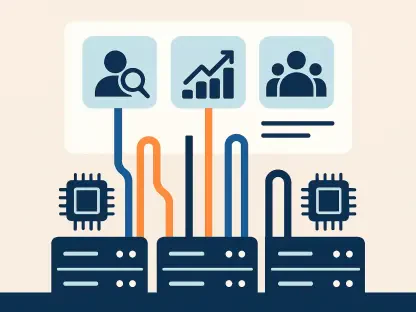In a rapidly evolving digital landscape, companies in the global supply chain face a choice: adapt to transformative technology or risk obsolescence. Artificial Intelligence (AI) promises to streamline operations, transform logistical frameworks, and provide competitive advantages to those who implement it. Logistics, traditionally a cumbersome and human-labor-intensive sector, is now on the brink of a digital revolution. The primary advantage of AI lies in its ability to automate complex processes, forecast market fluctuations, and offer holistic solutions to age-old challenges. Companies actively integrating these tools, such as automation and data analytics, are experiencing enhanced operational efficiency, reduced costs, and improved customer satisfaction. These tools not only facilitate daily tasks but also ease the pressures on human workers, allowing them to focus on strategic, value-added activities. As the supply chain becomes increasingly global and interconnected, the demand for robust AI solutions continues to grow.
The People-Centric Approach to Digital Transformation
For many companies, integrating advanced technologies involves more than just plugging in a new system. It requires a comprehensive strategy that places people at the heart of transformation. The global supply chain is marked by unpredictability, and traditional management approaches are no longer adequate to address these challenges. AI comes to the rescue by providing tools that help mitigate uncertainties, such as by automating routine tasks, flagging anomalies, and offering real-time data insights. These technologies alleviate the mental burdens placed on workers who would otherwise be firefighting operational complexities, thereby enabling them to focus on strategic growth and customer relationship-building. Navigating the emergent digital landscape means acknowledging the relationship between workers and technology. Companies must cultivate environments where technology acts as a supportive tool rather than a replacement for human judgment.
However, this paradigm shift requires logistical experts who can leverage AI to make informed, strategic decisions while also enhancing the well-being of their teams. People-centric technologies often yield better results because they are designed with the user’s experience in mind. For instance, workflow engines that streamline booking updates or offer real-time client tracking can significantly reduce service burdens. Furthermore, predictive analytics improve decision-making by forecasting demand trends and pricing volatility, empowering logisticians to act preemptively. The fusion of human intelligence and machine precision emerges as the ideal solution that allows companies to tackle the intricacies of the global supply chain effectively and empathetically.
AI Applications in Modern Supply Chains
AI is reshaping supply chain operations by making them more agile, reliable, and efficient. Among the most potent examples is the use of AI-driven predictive models, which allow companies to better anticipate disruptions and optimize asset utilization through real-time data analysis. For instance, AI forecasts can identify where containers will be needed ahead of time, reducing idle inventory and improving operational throughput. Similarly, AI-enabled dynamic pricing models help companies align leasing costs with actual market demand. These models adapt pricing based on equipment availability and evolving market trends, thereby optimizing returns for companies while enhancing client satisfaction.
Additionally, the integration of AI into logistics has revolutionized the booking processes. Sophisticated AI systems streamline bookings and manage transport logistics with remarkable accuracy, quickly freeing teams from menial tasks and enabling them to focus on resolving more complex issues. This transition alleviates operational friction and enhances overall efficiency. At the backend, AI-enhanced Enterprise Resource Planning (ERP) systems automate crucial functions such as container planning, invoice validation, and milestone tracking, minimizing human error and expediting response times. Each of these applications underscores how AI not only augments operational capacity but also elevates the quality of work life for employees.
Starting the Transformation with Pragmatic Steps
Embarking on a journey of digital transformation can be daunting, given the multitude of available AI solutions and the resources required for implementation. Prioritizing strategic partnerships and selecting AI solutions proven efficacious by industry leaders can help organizations avoid common pitfalls associated with new technology adoption. One effective starting point is to embed AI within existing ERP systems to automate complex logistical tasks. This integration enhances response times and boosts operational accuracy, benefiting the organization’s bottom line. Another pivotal step involves embracing AI-driven predictive analytics to anticipate long-term market trends and customer demands. This capability is especially valuable for managing extended shipping corridors.
Automated customer service tools driven by AI further complement these strategies by refining client interactions and reducing the workload on service teams. Workflow engines that deliver seamless updates and real-time tracking ensure a fluid, user-friendly customer experience. Companies aiming to thrive in this evolving environment will find that each step in this transformation is synergistic—working collectively to improve productivity, enhance employee satisfaction, and optimize client relationships. Rather than restructuring operations entirely, these AI-driven solutions integrate smoothly into existing frameworks, making it feasible for organizations to evolve without significant disruption.
The Road Ahead: A Call to Action for the Industry
In today’s fast-changing digital environment, companies in the global supply chain must decide whether to embrace transformative technologies or risk becoming outdated. Artificial Intelligence (AI) offers the promise of making operations more efficient, revamping logistics frameworks, and providing a competitive edge to those who use it. Traditionally seen as labor-intensive, the logistics sector is on the verge of a significant digital overhaul. AI’s major advantage lies in automating intricate tasks, predicting market changes, and addressing long-standing challenges with comprehensive solutions. Businesses adopting tools like automation and data analytics see improvements in operational efficiency, lowered expenses, and higher customer satisfaction. These technologies not only streamline daily operations but also reduce stress on human employees, enabling them to concentrate on strategic and high-value tasks. As the supply chain grows more globalized and interconnected, the need for strong AI solutions is increasingly essential, driving demand further.









